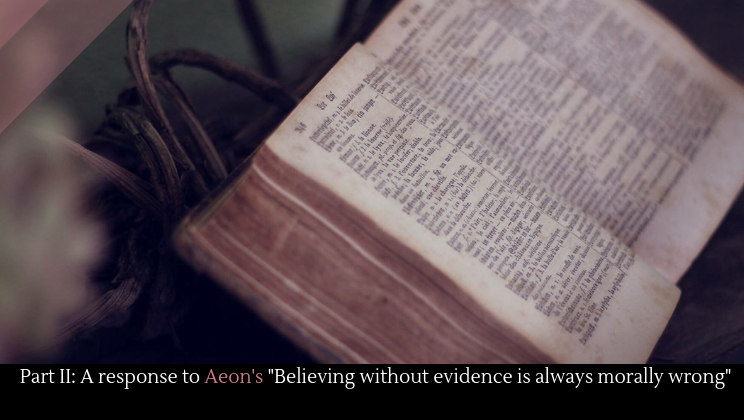Part II: A response to Aeon’s “Believing without evidence is always morally wrong”
Posted by Josh Taylor / November 13, 2018
In the first part of this piece, I summarized Francisco Mejia Uribe’s argument from the Aeon piece “Believing without evidence is always morally wrong,” taken fromWilliam Kingdon Clifford’s essay”The Ethics of Belief.” The upshot of that piece was this: Bad information leads to bad beliefs, and bad beliefs lead to bad actions. The moral of Uribe’s article is a good one: think more critically. The problem is that the author did think through his argument or his subject matter as thoroughly as he should have.
The root of the problem begins with the context of Clifford’s 1877 essay. The essay cannot be understood outside of its historical context, which in turn has implications for its contemporary significance. “The Ethics of Belief” emerged from “The Higher Criticism” or the historical criticism movement of the mid-to-late eighteenth century. The scholars of this movement turned a critical eye to the Bible, using historical methods to challenge the traditional, religious interpretations of the text. In brief, they challenged the belief-centered or faith-centered approach to the Bible––and eventually, as a result, the world. With that context, it’s easy to see how Clifford’s attack on belief without evidence emerged from this movement. William James, a pioneer of modern psychology, challenged Clifford’s attack on belief with his own defense of it––a defense that’s still cited by religious people today.
Clifford’s essay was thus rooted in the way he and his contemporaries thought about religion––and indeed about the world in its entirety. Like many people today, Clifford assumed that religion was synonymous with belief. As startling––and even counterintuitive or downright wrong––as it might sound, religion is not just about belief, and it certainly does not come from belief. Although Clifford was criticizing the over-credulity of his religious contemporaries, in his attacks on belief he was himself reinforcing its importance. In other words, by challenging the centrality of belief to religious life, he was making it the subject of debate. When William James replied to Clifford, he helped solidify belief’s role as the primary aspect of religious life. But belief is not, as I noted above, central to religion. Belief is central to a religion: Protestant Christianity.
“I am the resurrection and the life,” Jesus said to Martha, “The one who believes in me will live, even though they die (John 11:25).” Since the Reformation, Protestants have channeled their focus towards “belief.” This is known as sola fide, or “justification by faith alone.” They emphasize this in order to distinguish themselves from Roman Catholicism, which holds that ritual actions are as important as belief. Even in the late 1800s, anti-Catholicism in England (where Clifford was from) and America held enough sway over the social milieu to cause Clifford and his contemporaries to overlook the importance of actions. As good post-Enlightenment Protestants, they worried entirely about the life of the mind. Both Clifford and those he was arguing against agreed that the mind and the beliefs that took root there were the first principles of social life. You believe first, and then you act. The problem with Catholics, they felt, was that they were primitive––they used action instead of belief. Belief alone was sufficient, as long as that belief was proper.
Already we begin to see the problem in using Clifford’s 1877 essay to make any kind of point about modern society: the essay itself was mired in religious polemics and assumptions rooted in a particular time and place. With this foundation in mind, in the next piece I will argue that Uribe’s ultimate point is entirely moot, which is all the more detrimental because he’s still right! We do need to be more critical readers and more thoughtful citizens, he just (unfortunately, again) did not properly model critical reading or thoughtfulness.
More about news.
Thanks a lot for doing efforts for this useful information. I have gained knowledge from your blogs. Your excellent outlook towards this topic is very remarkable. Your help and support is really appreciated.
Great Post. Now i have to focus on keyword research. This is what where i didnt put any efforts. Thanks for sharing this.